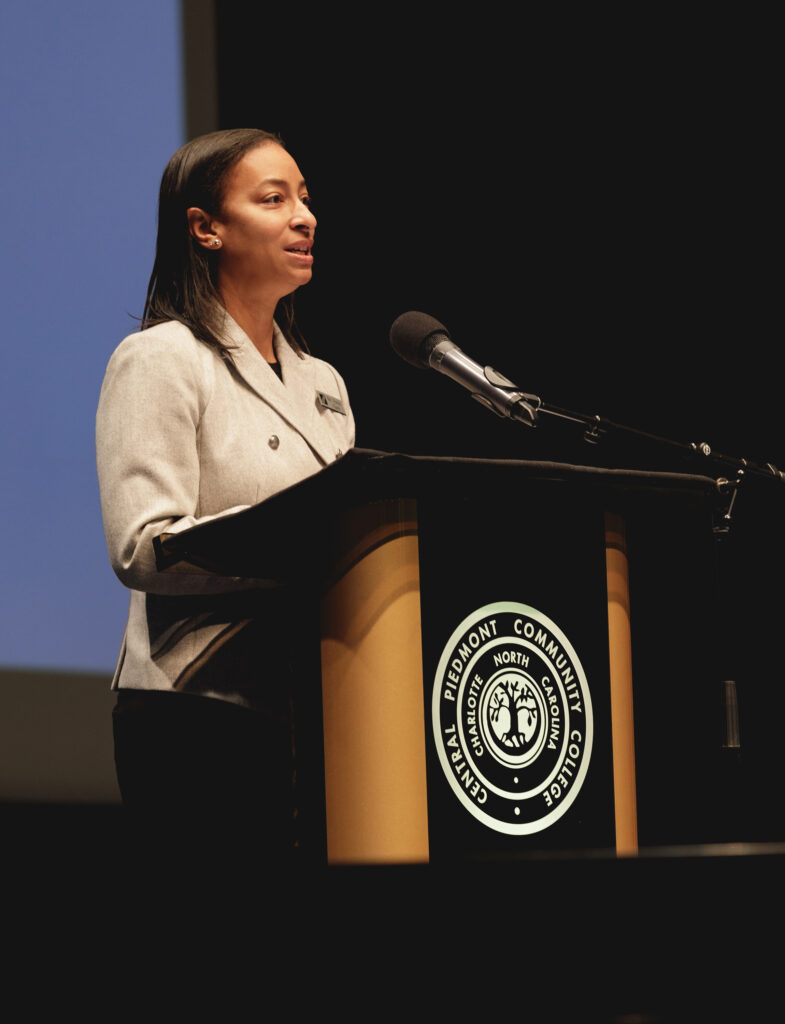FOR IMMEDIATE RELEASE
August 5, 2021
Contact: Jeff Lowrance, 704.330.6660, jeff.lowrance@cpcc.edu
Aspen Institute Contact: Monica Clark, monica.clark@aspeninstitute.org
Tracie Clark of Central Piedmont Chosen for
National Presidential Fellowship for Community College Leaders
40 aspiring community college presidents will participate in 2021-2022 Aspen Rising Presidents Fellowship to advance student success
CHARLOTTE, N.C.– The Aspen Institute College Excellence Program today announced that Dr. Tracie Clark, vice president of strategy and organization excellence, at Central Piedmont Community College, is one of 40 leaders selected for the 2021-22 class of the Aspen Rising Presidents Fellowship, a highly selective leadership program preparing the next generation of community college presidents to transform institutions to achieve higher and more equitable levels of student success.
The Rising Presidents Fellows will embark on the 10-month fellowship beginning in November 2021. Delivered in collaboration with the Stanford Educational Leadership Initiative, the fellows will be mentored by esteemed current and former community college presidents who have achieved exceptional outcomes for students throughout their careers, and will learn strategies to improve student outcomes in and after college, lead internal change, and create strong external partnerships with K-12 schools, four-year colleges, employers, and other partners.
Clark has worked at Central Piedmont 21 years in a number of important leadership roles, including communications faculty member, chair of the inaugural Quality Enhancement Plan Development and Implementation Committee, special assistant to the president, chair of the Student Success Leadership Team, and currently as a vice president – strategy and organization excellence.
“To become institutions that truly advance social mobility and talent development, community colleges must have presidents with a clear vision for equitable student success,” said Monica Clark, director of leadership initiatives at the College Excellence Program. “We have selected these fellows because they share that commitment and are well-positioned to become transformational leaders.”
“I am excited and proud that Dr. Tracie Clark will be a 2021-22 Aspen Rising Presidents Fellow,” said Dr. Kandi Deitemeyer, Central Piedmont president. “Dr. Clark epitomizes all of the qualities the Aspen Rising Presidents Fellowship seeks. She has a been leader, motivator and chief strategist in Central Piedmont’s efforts to improve our student experience and achieve greater levels of student retention and success among all of our students.
“Her leadership has been and will continue to be crucial as Central Piedmont endeavors to build more paths of opportunity and economic mobility for students beginning their higher education journey, seeking skills to build a family-sustaining career, or obtaining additional credentials for career growth,” Deitemeyer added.
The Aspen Rising Presidents Fellowship responds to the growing need for a new generation of leaders well-equipped to meet the challenges of the future. Nationally, nearly 80 percent of sitting presidents plan to retire in the next decade. While the traditional pathway to the presidency has often excluded women and people of color, the incoming class of Aspen Rising Presidents Fellows is composed of 68 percent women and 70 percent people of color, and represents institutions of varying sizes and locations.
Together, the 2021-22 fellows are leaders at colleges that collectively serve more than 400,000 students. As well, 67 Rising Presidents Fellowship alumni have become presidents of community colleges that collectively serve an additional 953,000 students nationwide.
-30-
About Central Piedmont Community College:
Central Piedmont Community College is one of the largest community colleges in the Carolinas, offering nearly 300 degree, diploma and certification programs; customized corporate training; market-focused continuing education; and special interest classes. Central Piedmont is academically, financially and geographically accessible to all citizens of Mecklenburg County. The college responds to the workforce and technology needs of local employers and job seekers through innovative educational and training strategies. Established in 1963, Central Piedmont has provided more than 55 years of service to Mecklenburg County residents, business and industry. For more information, see cpcc.edu. Connect with the college on social media at cpcc.edu/social.
The Aspen Institute College Excellence Program aims to advance higher education practices and leadership strategies that significantly improve student outcomes. Through the Aspen Prize for Community College Excellence, the Aspen Presidential Fellowship, and other initiatives, the College Excellence Program works to improve colleges’ understanding and capacity to teach and graduate students, especially the growing population of students from low-income backgrounds and students of color on American campuses. For more information, visit highered.aspeninstitute.org and follow us on Twitter at @AspenHigherEd.
The Stanford Educational Leadership Initiative (SELI) advances the critical cause of diversity, equity and inclusion in learning science and postsecondary education leadership. SELI’s research practice partnership with the Aspen Institute College Excellence Program has enabled faculty from the Stanford Graduate Schools of Education, Business and Engineering to host and prepare 200 Aspen Presidential Fellows to lead U.S. community colleges for student success in graduation and preparation for workforce advancement. For more information, visit seli.stanford.edu
The Aspen Institute is a global nonprofit organization committed to realizing a free, just, and equitable society. Founded in 1949, the Institute drives change through dialogue, leadership, and action to help solve the most important challenges facing the United States and the world. Headquartered in Washington, D.C., the Institute has a campus in Aspen, Colorado, and an international network of partners.

